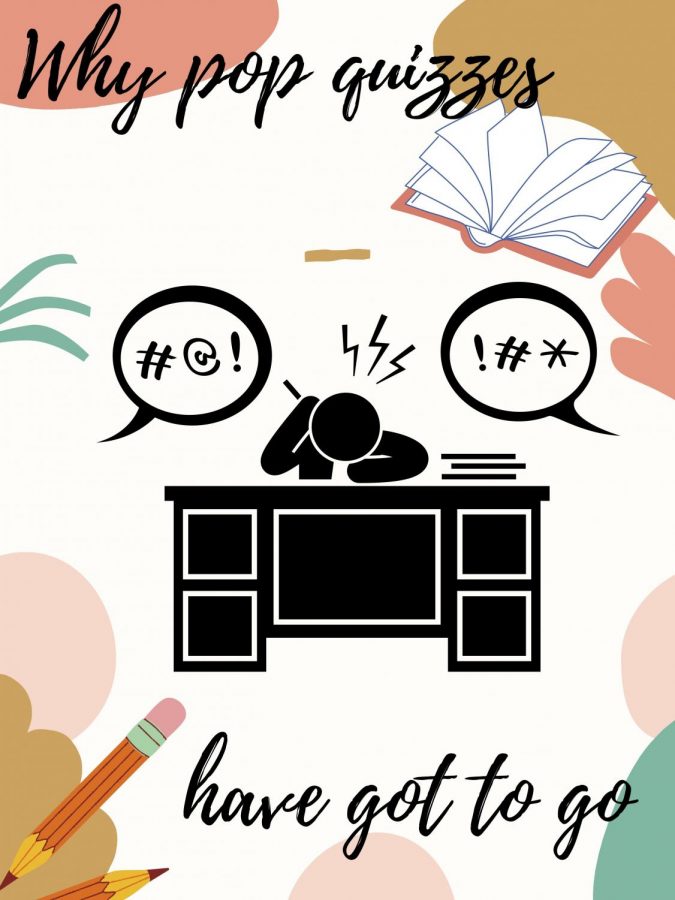Pop quizzes: why they should not exist
The negative consequences pop quizzes have on students.
You know that feeling when the teacher says, “alright guys, completely clear your desks, we are having a pop quiz!” These are words that strike terror in a student’s chest. The concept of pop quizzes has been around for decades, but it is definitely safe to say that these quizzes are not the most efficient way to test the knowledge or capabilities of a student.
Contrary to typical tests and quizzes, pop quizzes are distributed without an announcement in advance, hence the word “pop.”
The objective for giving out these quizzes is to make sure students are keeping up with their assignments and understanding the material. Nevertheless, one should never feel forced to understand lessons instructed in school immediately because everyone learns at a different pace.
Additionally, pop quizzes are rather unfair because they do not give students time to prepare beforehand. Ever since elementary school, I have been taught to use an agenda to plan out all of my projects, tasks and time to study. Pop quizzes utterly contradict that habit. As stated in Mary McDonald’s Systematic assessment of learning outcomes: developing multiple-choice exams, teachers should give students a 48-hour notice before quizzes so that they can sufficiently organize their schedules.
Some students rely solely on studying prior to a quiz to earn their high grades. Depriving students of that opportunity to put forth the work and effort that they would before an ordinary quiz appears to seem quite ineffective.
Extracurricular activities can also play a factor in how a student performs on a pop quiz. For example, some students could have hours of sports practice or work after school and not have time to thoroughly study material that they may or may not be evaluated on the following day.
Furthermore, these types of quizzes can cause our minds to go blank under the abrupt pressure to do well. For instance, even after reading all of the chapters assigned, several students, including myself, find that the context of it suddenly escapes our minds when the quiz sits in front of us.
Likewise, the questions given are generally based on a person’s proficiency in being able to recall specifics from the material that was taught previously. However, just because a student has read and understood the subject matter, does not mean they have memorized every little detail that might get asked on a pop quiz.
Not to mention that they also evoke unnecessary anxiety and panic. These tense feelings while taking the quiz can yield unwanted results.
As a matter of fact, referring to a study conducted by Missouri Western State University’s Department of Psychology, “without fair warning of a pop quiz, participants will have higher anxiety levels, which can interfere with their performance and lead to lower quiz grades.” Again, this proves the importance of how beneficial it would be if students knew about these quizzes ahead of time.
Although it’s rational for a teacher to want to make sure their students are staying on top of their priorities, pop quizzes just do not seem to be the most functional way of doing so. This manner of evaluation should be banned altogether because of its poor ability to measure a student’s full potential.






Joel • Nov 2, 2023 at 5:25 pm
Very wonderful read! Pop quizzes are absolutely terrible. Especially when they are harmful.
Ahsan Chowdhury • Nov 11, 2021 at 1:57 pm
Wonderful writing. Nicely articulated. Great job Yusha.
Farhan • Nov 11, 2021 at 1:52 am
A very well articulated and thought provoking article indeed.
It’s great to see students still critically thinking about how they are assessed and not giving in to the conventional education system which is definitely not perfect.
Well done!
Tameem • Nov 10, 2021 at 10:00 pm
Very thoughtful writing and really writer made in-depth study with references to show and reason out that Pop Up Quizzes are not very effective to measure the talents and preparation of students rather it might have a reverse impact on learning. I very courageous attempt by Yusha Ahsan Chowdhury at her age on a very sensitive assessment system which should be much appreciated and given a thought by appropriate authority. Thanks
Maddie Policastro • Nov 9, 2021 at 12:50 pm
Love this!!
Kendall Wilson • Nov 9, 2021 at 12:48 pm
Love this article! Amazing job Yusha!!